|
|
|
Sort Order |
|
|
|
Items / Page
|
|
|
|
|
|
|
| Srl | Item |
| 1 |
ID:
131537
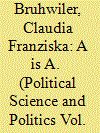

|
|
|
|
|
| Publication |
2014.
|
| Summary/Abstract |
In 1979, writer Tom DeFalco was paired with artist and cocreator of Spider-Man, Steve Ditko, to work on an issue of Machine Man, one of the many superheroes populating the universe of Marvel Comics. Instead of the usual introduction and business chatter, Ditko challenged DeFalco during a first conversation: "Are you Tom? What gives you the right to write about heroes?" (Tucker 2012). By the time of this exchange, Ditko had not only (co-) created and continued numerous superhero stories, ranging from Captain Atom to Dr. Strange or the Hulk, but he had also dedicated a lot of thought to the question as to what composed true heroism. In the 1960s, he had already found answers in a place not uncommon for that time, namely, in the novels of a Russian immigrant whose work should serve, in her own words, as "the projection of an ideal man".
|
|
|
|
|
|
|
|
|
|
|
|
|
|
|
|
| 2 |
ID:
131557
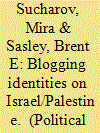

|
|
|
|
|
| Publication |
2014.
|
| Summary/Abstract |
Drawing on our research and blogging on Israel and the Israeli-Palestinian conflict, we make three claims about the role of scholar-bloggers in the social media age. First, as scholar-bloggers with some degree of ethno-national attachments related to our area of expertise, we contend that we are well positioned to issue the kinds of critiques that may resonate more deeply due to the very subjectivity that some perceive as a liability. Second, through the melding of scholarly arguments with popular writing forms, scholar-bloggers are uniquely poised to be at the forefront of public engagement and political literacy both with social media publics and with students. Third, the subjectivity hazard is an intrinsic part of any type of research and writing, whether that writing is aimed at a scholarly audience or any other, and should not be used as an argument against academic involvement in social media. Ultimately, subjectivities of both consumers and producers can evolve through these highly interactive media, a dynamic that deserves further examination.
|
|
|
|
|
|
|
|
|
|
|
|
|
|
|
|
| 3 |
ID:
131529


|
|
|
|
|
| Publication |
2014.
|
| Summary/Abstract |
As an abstract idea, openness is difficult to oppose. Social scientists from every research tradition agree that scholars cannot just assert their conclusions, but must also share their evidentiary basis and explain how they were reached. Yet practice has not always followed this principle. Most forms of qualitative empirical inquiry have taken a minimalist approach to openness, providing only limited information about the research process, and little or no access to the data underpinning findings. What scholars do when conducting research, how they generate data, and how they make interpretations or draw inferences on the basis of those data, are rarely addressed at length in their published research. Even in book-length monographs which have an extended preface and footnotes, it can sometimes take considerable detective work to piece together a picture of how authors arrived at their conclusions.
|
|
|
|
|
|
|
|
|
|
|
|
|
|
|
|
| 4 |
ID:
131531


|
|
|
|
|
| Publication |
2014.
|
| Summary/Abstract |
The number of people conducting scientific analyses and the number of topics being studied are higher than ever. At the same time, there are questions about the public value of social scientific endeavors, particularly of federally funded quantitative research (Prewitt 2013). In this article, we contend that data access and research transparency are essential to the public value of the enterprise as a whole and to the credibility of the growing number of individuals who conduct such research (also see Esterling 2013).
|
|
|
|
|
|
|
|
|
|
|
|
|
|
|
|
| 5 |
ID:
131547


|
|
|
|
|
| Publication |
2014.
|
| Summary/Abstract |
On June 26, 2012, Marvel's The Avengers became the third movie in history to earn $600 million dollars at the box office. The film was well received by fans and critics alike and it stood at the apex of a series of superhero movies released in the last decade. The mass appeal of the superhero, as evidenced by this success, has never seemed more powerful than in the years since September 11, a day that floored the likes of Captain America, who wept amidst the rubble with Spider-Man. "Some things are beyond words. Beyond comprehension. Beyond forgiveness" (Straczynski, Romita, and Hanna 2001, 2-3). In this atmosphere of uncertainty, comic book writers struggle to deal with the realization that, when America needed its heroes the most, they could only stand among the wreckage of the smoldering twin towers with the rest of us and ask "why?"
|
|
|
|
|
|
|
|
|
|
|
|
|
|
|
|
| 6 |
ID:
131539


|
|
|
|
|
| Publication |
2014.
|
| Summary/Abstract |
Comic book heroes often have their origins in noir depictions of failed or failing states. The danger involved and the seeming anarchy that necessitates superheroes recall Hobbes's description of a state of nature and Leviathan as resolution. But comic book heroes generally inhabit states that are better identified by the Hobbes-inspired Carl Schmitt. Indeed, this articles argues that while the Hell's Kitchen of Daredevil comics has some characteristics of a state of nature, it is better characterized by the protracted crisis of state that Schmitt sees in liberal democracies. Hobbes and Schmitt elucidate the crisis that generates the need for a superhero but fail to explain why the superhero does not simply take over the city. This is better explained by American concepts of heroism which emphasize redemption and walking away from power (Lawrence and Jewett 2002).
|
|
|
|
|
|
|
|
|
|
|
|
|
|
|
|
| 7 |
ID:
131543


|
|
|
|
|
| Publication |
2014.
|
| Summary/Abstract |
Set in 1978, the year Edward Said published Orientalism, Salman Rushdie's Midnight's Children depicts "magic children" born in the first hour of August 15, 1947, "within the frontiers of the infant sovereign state of India" (1981, 226, 224). Through some "freak of biology" or "preternatural power," the children receive "miraculous" abilities, including such superhero staples as flight, time-travel, and "a boy who could increase or reduce his size at will" (224, 227, 228). For his mind-reading narrator, Rushdie evokes the Shadow's 1930s radio slogan: "the ability to look into the hearts and minds of men" (229). The American Shadow, like so many of his descendants and predecessors, gained his powers from the mythical Orient, but the fantastical abilities that Rushdie awards the first citizens born in independent India mark the end of colonial exploitation and the transfer of real-world political power from colonizers to the formerly colonized.
|
|
|
|
|
|
|
|
|
|
|
|
|
|
|
|
| 8 |
ID:
131556


|
|
|
|
|
| Publication |
2014.
|
| Summary/Abstract |
We take advantage of the data set compiled by Masuoka et al. (2007, PS: Political Science and Politics 40 (1): 361-66) on lifetime citation counts of political science faculty at PhD granting institutions in the United States to look for "lucky names," that is, names parents can give babies that predispose them toward scholarly success in political science. Seeking to test an hypothesis offered by Wuffle (1972, PS: Political Science and Politics (Summer): 290), we also briefly look at the importance of middle initials for citation success in political science.
|
|
|
|
|
|
|
|
|
|
|
|
|
|
|
|
| 9 |
ID:
131554


|
|
|
|
|
| Publication |
2014.
|
| Summary/Abstract |
Unlike the massive literature about US Supreme Court confirmation battles, little has been written about lower federal court confirmation fights. However, in the past 20 years much has been written about the lower federal court confirmation process. Here, we take stock of the political science literature in this area and highlight where scholarly interest appears to be going. Believing a contemporary assessment of the state of the field should be of interest and use to scholars of American politics, we dissect the recent empirical literature and offer suggestions for future research. Most importantly, we offer a one-stop shop for recent literature for scholars interested in this topic.
|
|
|
|
|
|
|
|
|
|
|
|
|
|
|
|
| 10 |
ID:
131535
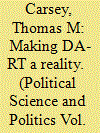

|
|
|
|
|
| Publication |
2014.
|
| Summary/Abstract |
Calls for greater data access and research transparency have emerged on many fronts within professional social science. For example, the American Political Science Association (APSA) recently adopted new guidelines for data access and research transparency. APSA has also appointed the Data Access and Research Transparency (DA-RT) ad hoc committee to continue exploring these issues. DA-RT sponsored this symposium. In addition, funding agencies like the National Institutes for Health (NIH) and the National Science Foundation (NSF) have expanded requirements for data management and data distribution. These pressures present challenges to researchers, but they also present opportunities.
|
|
|
|
|
|
|
|
|
|
|
|
|
|
|
|
| 11 |
ID:
131542
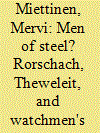

|
|
|
|
|
| Publication |
2014.
|
| Summary/Abstract |
Watchmen (1987), written by Alan Moore and illustrated by Dave Gibbons, is a 12-part graphic novel that portrays real-life superheroes in a fictional United States of the 1980s. An alternate universe where ordinary people without superpowers were inspired by superhero comics and took on the crime-fighting in tights in the 1940s, the comic portrays an America vastly different from our reality. Since its publication more than two decades ago, the comic has been the subject of extensive study due to its breathtaking narrative structure as well as its acute deconstruction of the superhero genre itself. Indeed, one of the text's most brutal deconstructions comes from the way it addresses superheroic masculinity, from the misogynistic vigilante Rorschach to the emasculated ex-hero Nite Owl. Through its cast of male heroes, Watchmen deconstructs the superhero genre by rewriting masculine tropes such as vigilantism and patriotism and by exposing the inherent contradictions within these gender-bound tropes from the fascist undercurrents of violent patriotism to the often-hinted sexual dysfunction of the costume-fetish variety.
|
|
|
|
|
|
|
|
|
|
|
|
|
|
|
|
| 12 |
ID:
131541


|
|
|
|
|
| Publication |
2014.
|
| Summary/Abstract |
Created by lawyer and psychologist William Moulton Marston, Wonder Woman first appeared more than 70 years ago, "as lovely as Aphrodite, as wise as Athena, with the speed of Mercury, and the strength of Hercules" (Marston and Peter 1941). While she conforms to traditional articulations of gender in the way she performs an attractive, female, white, heterosexual, middle-to-upper class woman, she also unsettles gendered boundaries through performing a determined, astute, formidable warrior at the same time. This has led to a number of writers exploring whether Wonder Woman can or should be viewed as feminist.
|
|
|
|
|
|
|
|
|
|
|
|
|
|
|
|
| 13 |
ID:
131551
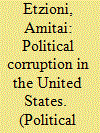

|
|
|
|
|
| Publication |
2014.
|
| Summary/Abstract |
To establish the scope and level of corruption in the contemporary United States, a collaborative project of political scientists is needed. Such a study should start with explicating the definition of corruption various scholars use. Three are noted here: using public goods for personal gains, deflecting public goods to private groups, and making such moves when these are legal although they are still illicit. To assess corruption on these levels, we must consider that various forms that "capture" takes beyond the corruption of the laws themselves. A study of the major differences in the level of corruption among the three branches of government may improve our understanding of the prevalence and causes of corruption. A study of "rent" may help predict that future course of corruption. Other topics whose study warrants collaborative investigation are listed.
|
|
|
|
|
|
|
|
|
|
|
|
|
|
|
|
| 14 |
ID:
131536
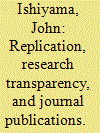

|
|
|
|
|
| Publication |
2014.
|
| Summary/Abstract |
Recently, the importance of research transparency via replication studies has been greatly discussed in most of the social sciences, political science included. Indeed, as Gherghina and Katsanidou (2013) and Freese (2007) note, to some extent, the discussion has been prompted by the tremendous changes in publishing in the past decade or so. With the enormous expansion in data availability and instant publication made possible by the Internet, there now are many opportunities to verify the findings presented in the discipline's major journals. "Replication, replication" has not only become the mantra for political science, but for economics, psychology, and quantitative sociology as well. These developments opened a debate on how to best "guard the high standards or research practice and allow for the maximum use of current knowledge for the further development of science" (Gherghina and Katsanidou 2013, 1; for similar sentiments see King 1995).
|
|
|
|
|
|
|
|
|
|
|
|
|
|
|
|
| 15 |
ID:
131533
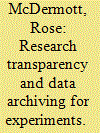

|
|
|
|
|
| Publication |
2014.
|
| Summary/Abstract |
Although still more common in medical studies and some other areas of social science such as psychology and behavioral economics, experimental work has become an increasingly important methodology in political science. Experimental work differs from other kinds of research because it systematically administers a specific treatment to part of a population while withholding that manipulation from the rest of a subject pool. The best studies strive to keep all other aspects of the experiment similar, so that any emergent difference between the treatment and control group that emerge provide unparalleled traction in determining causal inference. Many other valuable forms of social research use observation of the natural world, rather than depending on intervention to advance understanding. Because experimentalists can create the environment or process they want to study, this strategy of intervention and manipulation constitutes the main distinction between experimental work and other forms of social observation.
|
|
|
|
|
|
|
|
|
|
|
|
|
|
|
|
| 16 |
ID:
131555


|
|
|
|
|
| Publication |
2014.
|
| Summary/Abstract |
The social sciences are undergoing a dramatic transformation from studying problems to solving them; from making do with a small number of sparse data sets to analyzing increasing quantities of diverse, highly informative data; from isolated scholars toiling away on their own to larger scale, collaborative, interdisciplinary, lab-style research teams; and from a purely academic pursuit focused inward to having a major impact on public policy, commerce and industry, other academic fields, and some of the major problems that affect individuals and societies. In the midst of all this productive chaos, we have been building the Institute for Quantitative Social Science at Harvard, a new type of center intended to help foster and respond to these broader developments. We offer here some suggestions from our experiences for the increasing number of other universities that have begun to build similar institutions and for how we might work together to advance social science more generally.
|
|
|
|
|
|
|
|
|
|
|
|
|
|
|
|
| 17 |
ID:
131532


|
|
|
|
|
| Publication |
2014.
|
| Summary/Abstract |
In April 2013, a controversy arose when a working paper (Herndon, Ash, and Pollin 2013) claimed to show serious errors in a highly cited and influential economics paper by Carmen Reinhart and Kenneth Rogoff (2010). The Reinhart and Rogoff paper had come to serve as authoritative evidence in elite conversations (Krugman 2013) that high levels of debt, especially above the "90 percent [debt/GDP] threshold" (Reinhart and Rogoff 2010, 577), posed a risk to economic growth. Much of the coverage of this controversy focused on an error that was a "perfect made-for-TV mistake" (Stevenson and Wolfers 2013) involving a simple error in the formula used in their Excel calculations. The real story here, however, is that it took three years for this error and other issues to be discovered because replication files were not publicly available, nor were they provided to scholars when asked. If professional norms or the American Economic Review had required that authors publish replication files, this debate would be advanced by three years and discussions about austerity policies would have been based on a more clear-sighted appraisal of the evidence.
|
|
|
|
|
|
|
|
|
|
|
|
|
|
|
|
| 18 |
ID:
131553
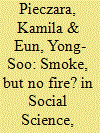

|
|
|
|
|
| Publication |
2014.
|
| Summary/Abstract |
Causality in social science is hard to establish even through the finest comparative research. To ease the task of extracting causes from comparisons, we present the benefits of tracing particularities in any phenomenon under investigation. We introduce three real-world examples from 2011: British riots, worldwide anticapitalist protests, and the highway crash near Taunton in southwestern England. Whereas all of these three examples have broad causes, we embark on the quest after specific factors. The Taunton accident can send a powerful message to social scientists, which is about the danger of making general statements in their explanations. Instead of saying much but explaining little, the merit of singling out the specific is substantial. As social scientists, when we are faced with "smoke" but no "fire," let us then focus on the part that is distinct.
|
|
|
|
|
|
|
|
|
|
|
|
|
|
|
|
| 19 |
ID:
131545
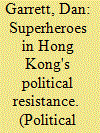

|
|
|
|
|
| Publication |
2014.
|
| Summary/Abstract |
In June 2013, explosive claims and illicit revelations of domestic and global American intelligence surveillance operations, hacking, and collaboration with US Internet and information technology behemoths rocked the world. Simultaneously, the mysterious emergence in the Hong Kong Special Administrative Region (HKSAR) of runaway American intelligence contractor Edward J. Snowden at the heart of the intrigue shoved the small enclave to the fore of global geopolitics. Claiming to rely on Hong Kong's respect for the rule of law and tradition of dissent to shield him against American retaliation and extradition, the dubious protagonist's statements ingratiated himself to local political groups who petitioned Hong Kong and central Chinese governments not to send him back to the United States. During "Defend Snowden" demonstrations at the US consulate in Hong Kong involving hundreds of supporters, placards bearing the image of US President Barack Obama parodied, mocked, and ridiculed the leader of the free world using iconic adaptations of Captain America, George Orwell's "Big Brother," and Shepard Fairey's Obama "Hope" visuals. Instead of an icon of "American freedom and ideology" (Serwer 2008) and an "idealized American nation" (Dittmer 2005, 627) Captain America, American president Barack Obama, and the United States of America were symbolically transformed into a signified Orwellian caped crusader threatening the world.
|
|
|
|
|
|
|
|
|
|
|
|
|
|
|
|
| 20 |
ID:
131550
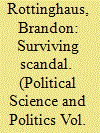

|
|
|
|
|
| Publication |
2014.
|
| Summary/Abstract |
Which factors shorten or lengthen the survival of a scandal involving a chief executive? Using new data tracking scandals involving presidents and governors from 1972 to 2011, I chart the duration of each political, personal, and financial scandal faced by an elected official, their staff, or nominees. I specifically examine institutional, political, and economic factors to investigate what factors quicken a "negative" end to a scandal. National chief executives and their staff are more likely to survive a scandal when they have more partisans in the legislature but are less likely when there is greater political opposition, however there is no comparative effect at the state level. Positive economic growth and public approval have no effect on survival of a scandal at either the national or state levels. These findings clarify how the political environment shapes the duration of executive scandal.
|
|
|
|
|
|
|
|
|
|
|
|
|
|
|
|
|
|
|
|
|